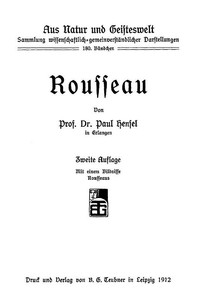Rousseau by Paul Hensel
"Rousseau" by Paul Hensel is a scholarly examination of the thoughts and philosophical contributions of Jean-Jacques Rousseau, written in the early 20th century. The text reflects on Rousseau's impact on the development of ideas concerning human nature, philosophy of history, and education, aiming to present a synthesis of his significant concepts without diving deeply into biographical details. Hensel seeks to provide a clear understanding of Rousseau's philosophy and its importance in the
context of Enlightenment thought. The opening of the work introduces the reader to Hensel's purpose and approach. He emphasizes Jean-Jacques Rousseau's role as a pivotal figure bridging the Enlightenment's classical ideas and emerging new notions of human existence. Hensel outlines Rousseau's inclination to reflect on the human condition and society's evolution, contrasting him with contemporaries like Voltaire. The author positions Rousseau as a visionary who, plagued by contradictions, sought to explore deeper truths about humanity and societal dynamics—setting the stage for a comprehensive dive into Rousseau's philosophical theories in subsequent chapters. (This is an automatically generated summary.)
Read or download for free
| How to read | Url | Size | |||
|---|---|---|---|---|---|
| Read now! | https://www.gutenberg.org/ebooks/44474.html.images | 276 kB | |||
| EPUB3 (E-readers incl. Send-to-Kindle) | https://www.gutenberg.org/ebooks/44474.epub3.images | 238 kB | |||
| EPUB (older E-readers) | https://www.gutenberg.org/ebooks/44474.epub.images | 240 kB | |||
| EPUB (no images, older E-readers) | https://www.gutenberg.org/ebooks/44474.epub.noimages | 141 kB | |||
| Kindle | https://www.gutenberg.org/ebooks/44474.kf8.images | 318 kB | |||
| older Kindles | https://www.gutenberg.org/ebooks/44474.kindle.images | 297 kB | |||
| Plain Text UTF-8 | https://www.gutenberg.org/ebooks/44474.txt.utf-8 | 262 kB | |||
| Download HTML (zip) | https://www.gutenberg.org/cache/epub/44474/pg44474-h.zip | 237 kB | |||
| There may be more files related to this item. | |||||
Similar Books
About this eBook
| Author | Hensel, Paul, 1860-1930 |
|---|---|
| Title | Rousseau |
| Credits | E-text prepared by Jana Srna, Norbert H. Langkau, and the Online Distributed Proofreading Team (www.pgdp.net) |
| Reading Level | Reading ease score: 60.6 (8th & 9th grade). Neither easy nor difficult to read. |
| Language | German |
| LoC Class | PQ: Language and Literatures: Romance literatures: French, Italian, Spanish, Portuguese |
| Subject | Rousseau, Jean-Jacques, 1712-1778 |
| Category | Text |
| EBook-No. | 44474 |
| Release Date | Dec 20, 2013 |
| Most Recently Updated | Oct 23, 2024 |
| Copyright Status | Public domain in the USA. |
| Downloads | 136 downloads in the last 30 days. |
| Project Gutenberg eBooks are always free! | |

